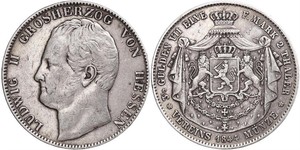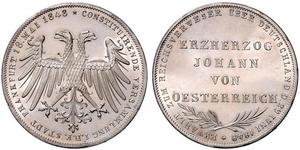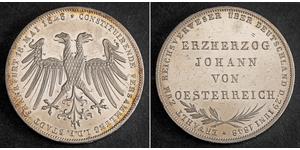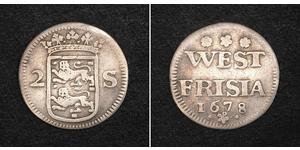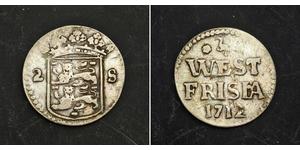1 Талер (продана за $112.0)
1864, Germany, Baden (Grand Duchy), Ferderick I. Silver Thaler Coin. XF-
Mint Year: 1864 Denomination: Thaler Reference: AKS 123, KM-240. Condition: Numerous contact-marks, rusty deposit spot in reverse around light rubbing is evident, otherwise XF+ Weight: 18.48gm Diameter: 33mm Material: Silver
Obverse: Head of Frederick I as Grand Duke of Baden right. Legend: FRIEDRICH GROSSHERZOG VON BADEN Reverse: Crown above coat-of-arms with a shield of Baden, supported by gryphons and adorned withou order chains. Legend: XXX EIN PFUND FEIN (18-64) EIN VEREINSTHALER
Edge: MÜNZVERTRAG VOM 24 JANUAR 1857 * ("(struck in accordance with the) Monetary contract of 24th of January, 1857.")
Frederick I (Frederick Wilhelm Ludwig) (September 9, 1826 – September 28, 1907) was the sixth Grand Duke of Baden from 1856 to 1907.
Frederick was born in Karlsruhe, on September 9, 1826. He was the third son of Grand Duke Leopold (1790–1852) and of his wife, Grand Duchess Sophie (1801–1865), who was born Princess of Sweden, daughter of King Gustav IV Adolf of Sweden.
He became the heir presumptive to the Grand Duchy upon the death of his father in 1852 and the accession of his brother as Grand Duke Louis II. Due to his brother's mental ill-health, he was Regent ad interim of Baden in 1852-1855, and took the title of Grand Duke in 1856. His brother, Louis II, died in 1858. He was considered a relatively liberal supporter of a constitutional monarchy. During his reign the option of civil marriages were introduced in Baden as well as direct elections to the Lower House of the Parliament of Baden in 1904.
In 1856, he married Princess Louise of Prussia, daughter of (then the crown prince) Wilhelm I and his wife, Augusta of Saxe-Weimar. The couple had three children:
The Grand Duke had a pivotal role in the history of the Zionist Movement. In 1896 the Grand Duke met Theodor Herzl (the founder of political Zionism) via the their mutual acquaintance the reverend William Hechler, and helped Herzl in obtaining an audience with his nephew, the German Emperor. After some persuasion on the part of the Grand Duke, the Emperor had finally accepted the appeal for an audience and it took place in Palestine in the October 28 1898, while the Kaiser was in his pilgrimage trip to Palestine.

|
Добавив:
anonymous 2017-05-24 |
|
||
|
||
|
||
|
||
|
||
2 Гульден null Срібло
в групі 72 монет / 71 цін
⇑
2 Stuiver Нідерланди Срібло
в групі 2 монет / 2 цін
⇑

-600-300-wwUKX9IS3W8AAAFcG1WA5TkN.jpg)

-300-150-_PsKb0OMcBMAAAFFw7jQktBZ.jpg)
 English
English





